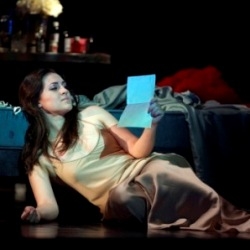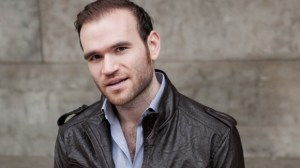La traviata (Glyndebourne)
Verdi’s most popular opera, sensationally played and sung, crowns the 2014 Glyndebourne season

© Richard Hubert Smith
The last time Elder conducted Verdi at Glyndebourne, in 2013’s equally brilliant revival of Falstaff, he drew unexpected colours from the score and found fresh dramatic emphases thanks to the period instruments of the Orchestra of the Age of Enlightenment. Here, bang up to date with the London Philharmonic Orchestra, he continued where he’d left off with an intense, slow Prelude that possessed the dream-like stillness of Wagner’s Parsifal – as though the demi-mondaine Violetta were in a troubled sleep with her act one party a delirious imagining.
This sublimely conducted account of La traviata, the tale of a young man’s love for a consumptive courtesan, featherbedded an evening of the most glorious singing this side of heaven. Russian soprano Venera Gimadieva made a house debut of the utmost distinction: her Violetta was flawless across the board, with the power and warmth of her voice, secure and evenly produced across the entire range, supported by interior acting that was searingly committed and extraordinarily moving.
Germont père et fils were no less remarkable. The American tenor Michael Fabiano, best known to UK audiences for his role as Gennaro in ENO’s Lucrezia Borgia, has matured into a charismatic leading man with vocal stylishness, physical dash and sheer star quality. Alfredo is a difficult nut to crack, with his conflicted moods and mercurial temper, but Fabiano got to the heart of him despite being saddled with an unbecoming mafioso wig.
Vocally every bit as luminous as his younger colleagues, Greek baritone Tassis Christoyannis gave an impassioned account of Alfredo’s father Giorgio, whom he played as an essentially good man who is propelled throughout by the best of intentions, be they misguided or not.
'a singer-friendly production'
The supporting cast was strong in depth and, as hinted above, the Glyndebourne Chorus (having a stonking season under Jeremy Bines) out of this world – helped on its celestial journey by Hildegard Bechtler‘s lowering, acoustically helpful designs. Bright and uncongested, the choral impact had an immediacy that was often startling.
Bechtler’s shallow stage should travel happily enough when Glyndebourne sends La traviata out on tour this autumn. Unobtrusively contemporary in mood, it wears its modern dress lightly with bucket seats and an Arco lamp set before a quilted flat and a sweeping upright, abetted by abstract projections that appear from time to time on a half-concealed cyclorama. It’s a clean canvas against which the intimate drama unfolds effectively, though on the downside it makes for uncomfortably cramped ensemble scenes.
Tom Cairns directs a decidedly singer-friendly production; but, while the solo performers seemed at ease, from the auditorium the visual experience was nondescript and the grand set pieces at Flora’s house party a bit of a mess. Apart from a movingly staged finale to that scene and some touching episodes in the concluding act, Cairns’s staging was neither here nor there. Given a less iridescent cast it could flounder.













